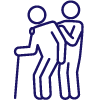Here's the text.
Election campaign
Last Updated May 1, 2024
Election campaigns and political activities
In general, all activities performed for political purposes are called "political activities."
Therefore, in a broad sense, "election campaigns" are also part of "political activities", but in the Public Office Election Law, they are theoretically clearly distinguished, and defining them can be interpreted as follows.
- Political activities All activities conducted for political purposes, excluding campaign-wide activities.
- Election Campaign Recommend voting for the purpose of winning a specific candidate in a specific election.

Figure showing the relationship between election campaigns and political activities (Source: the future of Japan that we open up)
Period during which election campaigns are held
Election campaigns can be held only from the time the candidate notification is received on the date of the announcement (notification date) to the day before the election day.
Campaigning before this period is prohibited by the Public Office Election Law as a pre-exercise.
Election campaigns are also prohibited on voting days.
Election campaign conducted by candidates
The main election campaign methods recognized by candidates under the Public Office Election Law are as follows.
However, depending on the type of election, the method, quantity and standard may differ.
- Establishment of election offices
- Use of election campaign vehicles
- Postcards for election campaigns
- Newspaper advertising
- Distribution of leaflets
- Election Bulletin
- Poster
- Street address
- Individual speech
- Election campaigns using the Internet, etc.
Election campaigns that anyone can freely do
The following actions can be freely performed by any voters during the campaign period:
Voting request by telephone
Election campaigns over the phone are not legally restricted.
※ It is forbidden to send telegrams.
Individual interview
You can request a vote from an acquaintance you happen to meet on the street or on a train, or a clerk can ask a vote for a customer who happened to come to a store or supermarket to shop.
※ Visiting electors' homes and asking for voting is prohibited as door-to-door visits.
Intermission speech
During the intermission of movies and plays, gatherings of youth women's organizations, and breaks at companies and factories, you can give speeches for election campaigns to those who are gathered there.
※ It is forbidden to gather an audience in advance and go there to give a speech.
Internet
After displaying contact information such as your e-mail address, you can call for a candidate you support on the website etc.
However, election campaigns using e-mail are limited to candidates and political parties.
People whose election campaign is prohibited
People who are completely prohibited from campaigning
- Specified public servants (members and staff of the Election Commission, judges, police officers, etc.)
- Persons under the age of 18
- A person who commits an election crime or a crime related to the Political Funds Control Law and does not have the right to vote or be elected
Persons prohibited in the relevant area
- Election clerks (election chief, voting manager, counting manager, etc.)
People who are prohibited from campaigning using their status
- Public servants of national and local governments
- Members, officers and employees of the public corporation and the public corporation
- Educator
Election campaigns that should not be done
Prohibition of door-to-door visits
It is not possible to visit homes, companies, stores, etc. door to door for the purpose of voting requests.
It is also not possible to talk about specific candidate names, political party names, or holding speeches.
Prohibition of Signing Campaign
Do not collect signatures from electors for the purpose of voting or not voting for specific candidates.
Prohibition of Publication of Popular Voting
Regarding elections, it is not possible to make a popular vote that predicts which candidate will be elected in the election and publish its progress or results.
Prohibition of food and drink
Do not provide food or drink for election campaigns.
However, tea and tea confections and fruits that are usually used are excluded.
You can also provide a certain number of lunch boxes to be given to campaigners.
Prohibition of vigorous acts
For election campaigns, you must not connect cars or come and go in platoons to get the eye.
Election campaigns under the age of 18
People under the age of 18 cannot campaign or use people under the age of 18 to campaign.
Acquisition
It refers to giving or entertaining money or goods to electors or campaigners in order to have a particular candidate vote or not to vote, and is the most malicious of election crimes. Yes, and strict penalties are set by law.
Elections may be invalidated if the candidate, as well as the person in charge of the election campaign, are punished.
Greetings after the election
After the election is over, greetings to electors regarding elections and defeats are prohibited.
For example, door-to-door visits to supporters' homes, celebration celebrations and other gatherings, and distribution and posting thank-you postcards and signboards are prohibited.
Inquiries to this page
Kohoku Ward Election Commission Office (Statistics and Elections Section General Affairs Division)
Telephone: 045-540-2213
Telephone: 045-540-2213
Fax: 045-540-2209
Email address: ko-toukeisenkyo@city.yokohama.jp
Page ID: 636-018-818













